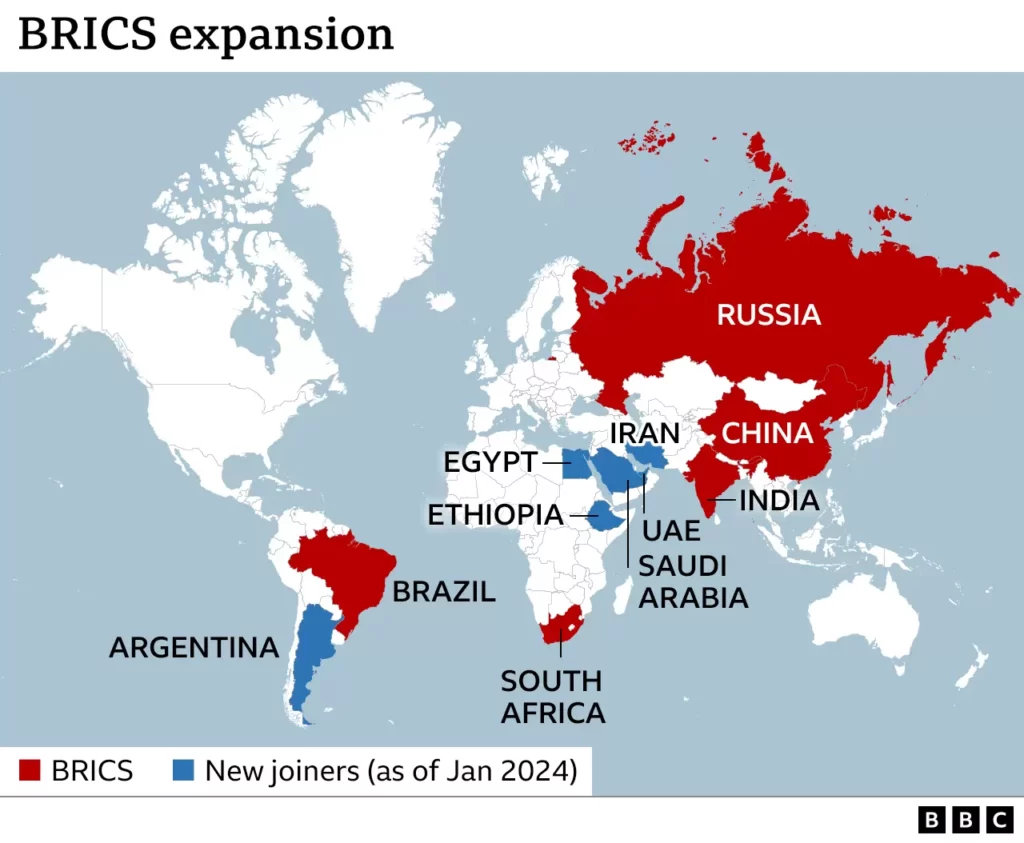BRICS expansion comes as a counterweight to Western-dominated political and economic institutions, and reliance on the U.S. dollar. This constitutes a form of grievance-based politics.
BRICS – the name for the grouping of emerging economies: Brazil, Russia, India, China, and South Africa – will soon expand.
Following its 15th annual summit in Johannesburg, South Africa. A formal invitation was extended to 6 countries: Argentina, Egypt, Ethiopia, Iran, Saudi Arabia, and the United Arab Emirates (UAE).
BRICS provides a vehicle for countries out-of-favor with Washington, facing economic exclusion or sanction regimes, to co-operate thereby mitigating the effects of exclusionary measures.
BRICS countries now account for 75% of the world’s manganese, 50% of the globe’s graphite, 42% of the world’s oil production, 28% of the world’s nickel, and 10% of copper.
This poses a choice for Washington: re-engage or push nations further toward one-another, and further away from its sphere of influence.
Below, we delve-deeper the significance of BRICS and its expansion.
BRICS is not anti-US, it is anti-dependency
Many observers have labelled BRICS as a coalition of anti-U.S. countries, but this is an oversimplification.
BRICS expansion means the group now includes Russia, Iran, and China. The former are openly antagonistic to the U.S. in the face of economic sanctions. The latter, the U.S. perceives as a direct threat to its global leadership.

Whilst Russia and Iran may wish to steer the group in this direction, for most of BRICS, including China, leveraging a collective voice proceeds enhanced co-operation with the U.S. and its allies.
BRICS is not anti-US, it is anti-dependency. What unites members is contempt for western-led financial institutions, and reliance on the U.S. dollar.
Weaponization of the U.S. dollar has accelerated support for BRICS
Last year, the U.S. and its allies took the decision to use their economic might to punish Russia following its invasion of Ukraine, but the move has alarmed leaders around the world.
‘We call for reform of the International system,
XV BRICS Summit, Johannesburg II Declaration, 2023
and a greater role for emerging markets and developing countries, in leadership positions in its institutions’
Freezing nearly half ($300bn) of Russia’s foreign currency reserves and removing Russian banks from SWIFT, a financial service facilitating international payments, is a move akin to a nuclear bomb in the financial world, symbolic of the weaponization of currency.
Policy development of an alternative international payment system of localized currency to de-risk countries against U.S. weaponization of its dollar is underway. This process is often referred to as de-dollarization and occurs in tandem with other BRICS development initiatives such as the New Development Bank.
These initiatives aim to support the development of emerging economies and provide competition to established institutions such as the International Monetary Fund (IMF) and World Bank, which stand accused of cripplingly high interest rates which lock emerging economies into debt.
This narrative is convincing for many countries, but others view it as a convenient truth Chinese leadership uses to entice emerging economies to be pawns in its own grand strategy.
BRICS expansion aligns with Chinese foreign policy goals…and doesn’t align with the West’s
For cynics, the alignment of BRICS expansion with Chinese foreign policy is a convenient truth. But for the Chinese, and an increasing number of others, it is more symbolic of an inconvenient truth for the West – its eroding grip on natural resources and power.
With the exception of Argentina, the new BRICS members are MENA countries (Middle East and North Africa). Their admission is symbolic of the regions shift from the American sphere of influence to the Chinese – the strongest advocates for BRICS expansion.
U.S withdrawal from the Middle East left a power vacuum China has been keen to fill. China’s role in brokering the détente between Iran and Saudi Arabia, whose conflict had destabilized several countries in the Middle East – including Iraq, Syria, Lebanon, Yemen, and Bahrain already warranted international significance but institutionalizing the relationship represents a major next step toward a more secure long-term relationship, and enhanced leadership prospects for China in the region.
Similarly, Egypt and Ethiopia bridge Africa and the Middle East, conflict concerning rights to the Nile River similarly plagued the relationship. Their admissions and prospects for a more stable relationship compliments Chinese geopolitical ambitions by connecting its foreign policy initiatives on both continents. Yet alignment with Chinese foreign policy shouldn’t detract from the facts on the ground.
The Facts on the Ground
China’s increasing presence in Africa provides economic options and leverage for African nations concerning resource extraction. Localized currency offers a degree of financial flexibility when it comes to debt servicing emerging economies, and a growing presence in the Middle East and South America diversifies control over critical minerals.
This amounts to considerable negotiating power for a group of countries united by a shared history of unfavorable relationships with the West.
Yet for all its potential, BRICS has achieved little for an organization that is 13 years old. Tangible outcomes remain to be seen, but it is clear the voice of emerging economies is growing louder. What they wish to do with it, only time will tell.


